 W
WThe House of Lusignan was a royal house of French origin, which at various times ruled several principalities in Europe and the Levant, including the kingdoms of Jerusalem, Cyprus, and Armenia, from the 12th through the 15th centuries during the Middle Ages. It also had great influence in England and France.
 W
WAymer de Valence, 2nd Earl of Pembroke was a Franco-Welsh nobleman. Though primarily active in England, he also had strong connections with the French royal house. One of the wealthiest and most powerful men of his age, he was a central player in the conflicts between Edward II of England and his nobility, particularly Thomas, 2nd Earl of Lancaster. Pembroke was one of the Lords Ordainers appointed to restrict the power of Edward II and his favourite Piers Gaveston. His position changed with the great insult he suffered when Gaveston, as a prisoner in his custody whom he had sworn to protect, was removed and beheaded on the instigation of Lancaster. This led Pembroke into close and lifelong cooperation with the King. Later in life, however, political circumstances combined with financial difficulties would cause him problems, driving him away from the centre of power.
 W
WConstantine IV was the King of Armenian Cilicia from 1362 until his death. He was the son of Hethum of Neghir, a nephew of Hethum I of Armenia. Constantine came to the throne on the death of his cousin Constantine III, whose widow, Maria, daughter of Oshin of Corycos, he married.
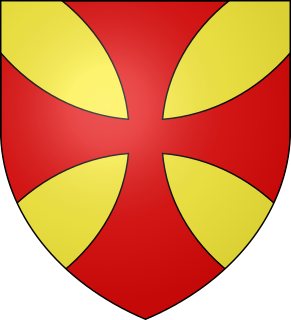 W
WEschiva of Ibelin (1160–1196) was a queen consort of Cyprus.
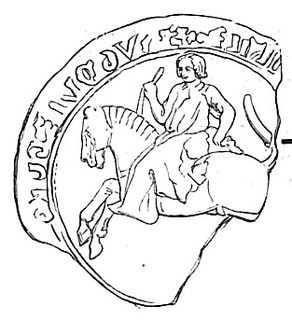 W
WHugh IX "le Brun" of Lusignan was the grandson of Hugh VIII. His father, also Hugh, was the co-seigneur of Lusignan from 1164, marrying a woman named Orengarde before 1162 or about 1167 and dying in 1169. Hugh IX became seigneur of Lusignan in 1172, seigneur of Couhé and Chateau-Larcher in the 1190s, and Count of La Marche on his grandfather's death. Hugh IX died on the Fifth Crusade at the siege of Damietta on 5 November 1219.
 W
WHugh X de Lusignan, Hugh V of La Marche or Hugh I of Angoulême succeeded his father Hugh IX as Seigneur de Lusignan and Count of La Marche in November 1219 and was Count of Angoulême by marriage.
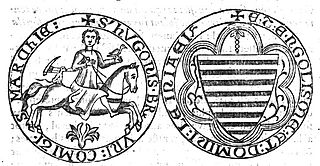 W
WHugh XIII of Lusignan, Hugh VIII of La Marche or Hugh IV of Angoulême succeeded his father Hugh XII as Seigneur de Lusignan, Count of La Marche and Count of Angoulême in 1270.
 W
WIsabella of Angoulême was Queen of England as the second wife of King John from 1200 until John's death in 1216. She was also suo jure Countess of Angoulême from 1202 until 1246.
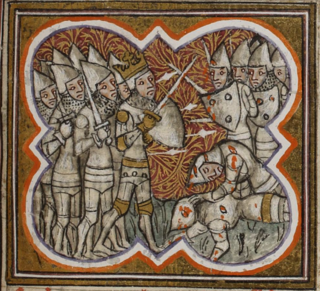 W
WRaoul I of Lusignan was the second son of Hugh de Lusignan and the grandson of Hugh VIII of Lusignan. He was a prominent nobleman in the region of Poitou, and lord (seigneur) d'Exoudun, de Melle, de Chizé, de Civray and de La Mothe. He also became Count of Eu, by marriage to Alix d'Eu. Since the region of Poitou was contested between kings of France and England, local nobility was often changing sides. Up to 1201, Raoul was loyal to kings of England, but than changed his allegiance to king of France. He later rejoined the English side, and took part in the Battle of Bouvines (1214). For his services to the king England, he was granted possession of Hastings and Tickhill, in 1216. Earlier, he participated, as a young knight, in the Third Crusade, and later again in the Fifth Crusade, and died upon return. He was buried at the Priory of Fontblanche, in Exoudun.
 W
WRaoul II of Lusignan was the son of Raoul I of Lusignan and his wife Alix, Countess of Eu. He became Seigneur d'Exoudun, Count of Eu and of Guînes upon his father death in 1219.
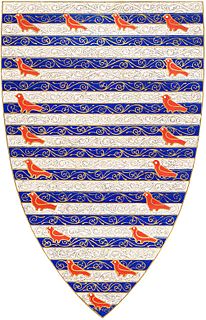 W
WWilliam de Valence, born Guillaume de Lusignan, was a French nobleman and knight who became important in English politics due to his relationship to King Henry III of England. He was heavily involved in the Second Barons' War, supporting the King and Prince Edward against the rebels led by Simon de Montfort. He took the name de Valence after his birthplace, Valence, near Lusignan.